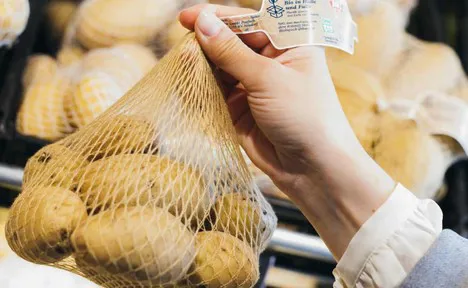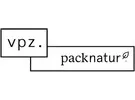Exactly 10 years ago, the first Packnatur® net packaging from the VPZ packaging center made of Lenzing Modal Color beechwood fibers for potatoes, onions, beetroot and black radish for the Ja! Natürlich, the REWE Group in Austria in the trade. The organic consumers were enthusiastic and the REWE Group generated several hundred likes on social media within a few hours when it was launched.
A successful model for green packaging was born
In a joint effort by the companies Lenzing (fiber manufacturer), Borckenstein (spinning mill), EOM producer organization Marchfeldgemüse (packaging company for organic vegetables), Henning (network production) and VPZ packaging center, after 2 years of development the Austrian REWE Group was able to develop a 100% replacement for the plastic net, which almost completely dominates the market, was offered and thus a world first was developed that is successful internationally today and generates a high added value for Austria.
Organic suits Austria and has a role model effect. This is shown by the Austrian REWE Group, which more than 20 years ago Ja! Natürlich, Europe's first organic brand has also developed plans, as has Lenzing AG, world market leader in ecological cellulose fiber production. Local beech wood from the thinning of certified forests is used. The VPZ has been researching biogenic packaging out of conviction for more than 30 years and has been able to set up a multi-award-winning industrial company in Neudau in Eastern Styria with this innovative packaging idea in recent years.

Pleasant feel and protection of the products
"Ja! Natürlich, this philosophy was inspiring and we share a common concern here. More than ten years ago, long before the term "green packaging" was on everyone's lips, Ja! Natürlich started to eliminate packaging wherever possible and replace it with more environmentally friendly alternatives where necessary. One of the best examples of an ecological packaging alternative is the innovative, compostable cellulose net, which was quickly adopted for packaging everything from citrus fruits, potatoes and onions to black radishes at Ja! Natürlich it was used and is still in use here," says Dr. Andreas Steidl, Managing Director of Ja! Natürlich Ltd, looking back.
According to Steidl, the advantages of the cellulose net are not only found in their ecological effects, but also in their pleasant feel and the protection they offer. "Especially with regard to citrus fruits, this aspect is of particular relevance for Ja! Natürlich. Because with citrus fruits, there must be no surface preservation of the fruits in order to prevent mold formation or early spoilage. The sustainable cellulose nets are particularly gentle in this respect and are therefore a perfect alternative to Plastic packaging material, and if we have one more wish for the future, it would be a compostable solution for the net closure instead of the metal clip.”
“When Lenzing AG started developing compostable fruit and vegetable nets many years ago in close cooperation with VPZ/Packnatur®, nobody would have guessed that this application would develop so successfully. Today, LENZING™ for Packaging is an established segment for Lenzing and makes an important and constantly growing contribution to the diversification of the Lenzing application portfolio. Especially in times when the textile industry is subject to great uncertainty and declining demand due to various crises, we are all the more pleased about the joint growth with VPZ/Packnatur®", says Georg Raffael Spindler of Lenzing AG.
Greater consumer awareness
For the future he expects a further strong increase in demand for ecologically sustainable networks. Spindler: "On the one hand, this is due to the changed legal regulations, such as recently in France (accelerated single-use plastic directive), but on the other hand also to greater awareness on the part of the consumer. Both factors will continue to lead to a rethinking of the supermarkets/ I and the entire Lenzing AG are looking forward to the further close cooperation with VPZ as well as to the many success stories that the Packnatur® brand is guaranteed to write in the future."
DI Herbert Bucher, managing director of the producer organization Marchfeldgemüse, points out the relevance of comprehensive cooperation work. "It is important to us that we always have a competent contact at our side who supports us in implementing the requirements of our customers. Innovative packaging is indispensable for the marketing of our vegetable products. In a very fast-moving business environment, we need short distances from the emergence of an idea to the finished packaging. The Packnatur team supports us competently and solution-oriented as well as with the necessary view of the economic feasibility. I look forward to many more years of constructive cooperation and wish our partners all the best!"
Establishment of an industrial production
As Managing Director of Borckenstein Ltd, Manfred Kern created the appropriate yarn profile for Packnatur and is now Managing Director of the Packnatur production facility in Neudau. "When the company founder Helmut Meininger approached me with this idea more than 20 years ago, I found it very interesting as the then CEO of the Borckenstein spinning mill and developed a suitable yarn together with the fiber manufacturer Lenzing. The idea caught on; When the market potential matured and the demand grew accordingly, the joint decision was made to set up industrial production," he says.
"The Neudau location was the obvious choice, since employees with textile knowledge were available after the Borckenstein company closed. Within just under four years of the start of production, the third expansion stage went into operation in 2022. The fourth production hall is expected to open in mid-2023 As chairman of the textile industry of the WKÖ, I am also very pleased that a new area of application has opened up for the textile industry and that new jobs have been created through innovative investments."
For more information:
lenzing.com/de 
eom.at
www.janatuerlich.at
www.vpz.at
